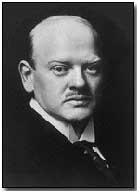Who's Who - Gustav Stresemann
 Gustav Stresemann (1879-1929)
was a National Liberal Party deputy in the Reichstag from 1907 and an
enthusiastic supporter of ambitious German war aims.
Gustav Stresemann (1879-1929)
was a National Liberal Party deputy in the Reichstag from 1907 and an
enthusiastic supporter of ambitious German war aims.
After the armistice he served in increasingly influential government positions, acting for a brief period as German Chancellor.
Born on 10 May 1878 the son of a restaurant and tavern owner, Stresemann studied literature, philosophy and political economy in Berlin and Leipzig before entering commerce in 1901 aged 22.
Initially a clerk in the Association of German Chocolate Manufacturers in Dresden he took over as business manager of the local branch of the Manufacturers Alliance, an association of local entrepreneurs the following year, in 1902. Even at this early stage Stresemann, while representing capitalism, understood the need to recognise trade unions in the workplace.
Becoming politically active Stresemann was elected to Dresden town council in 1906 (a seat he held until 1912) and in 1907 was elected to the Reichstag as a member of the National Liberal Party.
A passionate supporter of stronger German armed services Stresemann came out publicly in favour of boosting naval production in 1907 and remained a keen supporter of Admiral Tirpitz's policy of building up the role of the German navy in wartime.
He consequently spoke in support of Tirpitz's policy of unrestricted submarine warfare in 1916: ultimately a disastrous policy in that it finally drew the U.S. into the war against the Central Powers.
A close colleague of Ernst Bassermann he succeeded him as National Liberal Party leader in 1917. Despite his conviction that constitutional reform was a necessity he was nevertheless a confirmed monarchist and remained convinced of the benefits of colonial expansion, even to the extent of supporting sweeping annexationist policies.
He was therefore an admirer of the policies of the Third Supreme Command, the effective military dictatorship led by Paul von Hindenburg and Erich Ludendorff. He connived with both in engineering the downfall of Theobald von Bethmann-Hollweg as Chancellor, with the consequent installation of puppet Chancellors dominated by the military high command.
In January 1918 the NLP split with the socialists over the latter's support for munitions strikes in Berlin. Later that year the party disintegrated as revolution engulfed the German political scene. Consequently Stresemann's return to the Reichstag in 1919 was at the head of his own party, the German People's Party.
His post-war views were stridently right-wing. In common with virtually all Germans he despised the Versailles treaty and believed the financial reparations it imposed upon Germany to be unreasonable. He was also concerned with the removal of foreign troops from German soil, and advocated political union with Austria and a restoration of Germany's eastern borders.
In political opposition until 1923 he served briefly as coalition Chancellor from 13 August to 23 November that year. His successor as Chancellor appointed him Foreign Minister, a position he held until his death in 1929.
During this period he successfully negotiated the Locarno Pact with Russia in 1925 and secured German admittance to the League of Nations in 1926, the same year he was awarded the Nobel Peace Prize.
On 3 November 1929 Stresemann suffered a stroke and died while in Berlin at the age of 51.
Shrapnel comprised steel balls ejected from shells upon detonation.
- Did you know?
